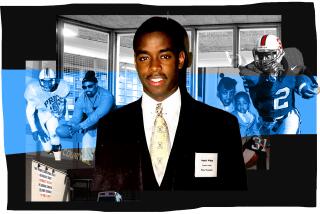In Grief, a Search for Answers
- Share via
On the same day a coroner ruled that bronchial asthma caused the death of Northwestern safety Rashidi Wheeler, the player’s mother angrily questioned the degree to which athletes are pushed in preseason training camps.
Wheeler, who played at La Verne Damien High, collapsed during conditioning drills Friday and died soon after. The Cook County coroner’s ruling, issued Saturday, listed the cause of death but gave no further details.
As she prepared to travel to Evanston, Ill., to collect her son’s body, a sobbing Linda Will wondered how the 22-year-old, who had played for years with asthma, could suddenly die from it.
“My opinion on this is that athletic personnel are pushing humans beyond what humans are capable of,” Will said from her Ontario home. “Coaches tweak and torque the athlete to see how far he can be pushed.”
Wheeler was the fourth in a recent string of football deaths.
Minnesota Viking lineman Korey Stringer died of heatstroke Wednesday. Travis Stowers, a 17-year-old high school player in Indiana, also died Wednesday after collapsing in practice the previous afternoon. On July 25, University of Florida running back Eraste Autin died of heatstroke complications related to a July 20 workout.
At Northwestern’s practice field near Lake Michigan on Friday, Wheeler had run two dozen sprints ranging in length from 40 to 100 yards when he began struggling to breathe. He was carrying an inhaler, as he did throughout his career.
“I’m not blaming Northwestern,” his mother said. “In my opinion, there should be an investigation into all these [summer] camps.”
Northwestern will reevaluate its conditioning policies and review the incident “to find out if there is any possible way we could have done something better,” Athletic Director Rick Taylor said at a Saturday news conference.
Coach Randy Walker wasn’t ready to say if his view on conditioning drills would change. “At some point, you get back up on the horse and go on, but I don’t have to do that right now,” he said.
The team was well aware of Wheeler’s medical condition. The senior had passed a July 12 physical and was among approximately 10 asthmatics on the roster.
“I don’t think there is anything unusual for a person with asthma to compete in the upper class of athletics,” Taylor said.
Wheeler, a 6-foot-2, 212-pound strong safety, was Northwestern’s third-leading tackler in 2000, helping the Wildcats to a share of the Big Ten championship, and was expected to anchor the defense this fall.
Walker and his coaching staff were not allowed to attend Friday’s workout because of NCAA rules, but team trainer Tory Aggeler and his medical staff were present. Walker said the drill in which Wheeler collapsed was common for training camp, with recovery periods between each sprint, but teammates reported that Wheeler had been worried about all that running.
The temperature was in the low 80s--the mildest they’d had in days, several players said--but Wheeler experienced trouble with several sprints remaining. Even after he collapsed, team staff thought they had the situation under control.
“As we were removing him from the field, he said, ‘No, no,’ ” Aggeler told the Associated Press. “He was alert and we were administering to him in a situation that didn’t appear at that time to be totally emergent.”
Then Wheeler stopped breathing and had no pulse. He did not respond to CPR administered by staff or paramedics and died about an hour later at Evanston Hospital.
Two of Wheeler’s former high school teammates said they could not recall the player having a serious problem with asthma during his career at Damien, where he lettered in football, basketball and track.
“If he felt winded, he did his inhaler and he was right back in the drill,” Darnell Pahrms said.
Brian Allen, now at Stanford, said: “It’s hard for me to believe it was just asthma.”
A memorial service was being planned in Evanston. The family expected to accompany Wheeler’s body back to Los Angeles on Tuesday.
“He had a dream of becoming a pro player and what is so sad is that he wanted to do it for all the right reasons,” his mother said. “He wanted a way to help others, to bring attention to the underprivileged children of our society. He was so compassionate that it seemed everyone who met him became a better person by knowing him.”
As she prepared to leave, Linda Will held one of her son’s athletic awards. It was a team plaque he received just last season for being in outstanding physical condition.
More to Read
Go beyond the scoreboard
Get the latest on L.A.'s teams in the daily Sports Report newsletter.
You may occasionally receive promotional content from the Los Angeles Times.












